General
Interview with Chancellor Hon. Dr. Kiyonga on His Vision for Makerere
Published
5 months agoon
By
Mak Editor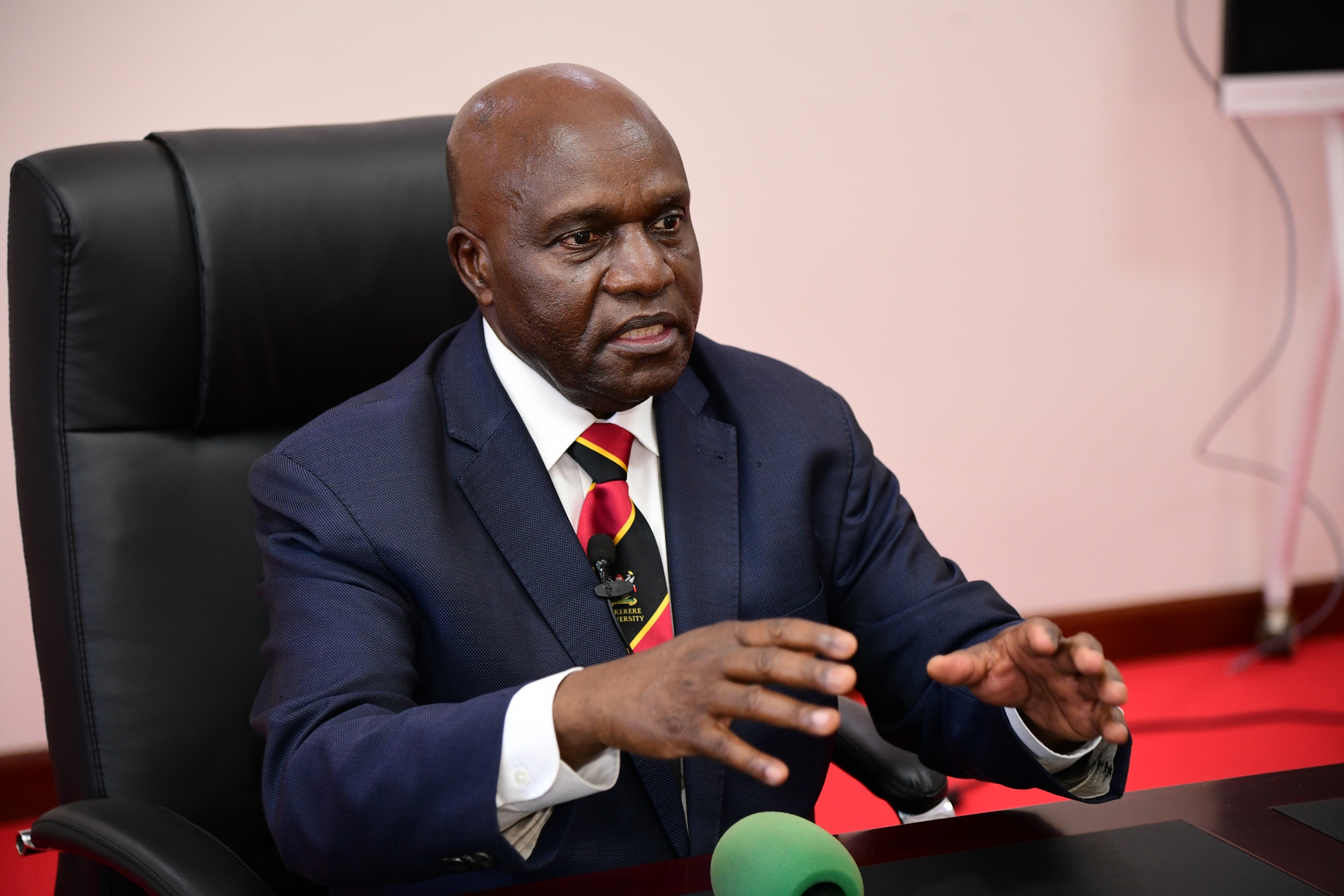
Preamble
Hon. Dr. Crispus Kiyonga, the fourth non-Head-of-State Chancellor was officially installed on 2nd October 2024 at a ceremony presided over by the President of the Republic of Uganda and Visitor of Makerere University H.E. Yoweri Kaguta Museveni. Hon. Dr. Kiyonga fresh from presiding over the 75th Graduation Ceremony of Makerere University held 13th to 17th January 2025 had an interaction with the Public Relations Office and shared his vision for his Alma Mater.
Welcome Remarks
I welcome you to this brief meeting. I thank you for coming. Today Friday, we have come to the end of the Graduation Week. We started this particular assignment on Monday and each day we have been graduating students until today. We had a total of 13,658 students ranging from PhD through Masters, through Bachelors and some Diplomas.
The fact that in one week we graduated over 13,000 students tells you that 1) Makerere has indeed grown; it has expanded. When I graduated here in 1978, it was just a one-day ceremony. But because of the numbers, we are taking the whole week and on each day, we are almost graduating over 1,000 students. 2) Makerere University has also grown in terms of the disciplines. Now we talk about ten colleges including the School of Law. The courses are very varied. I think the most important thing is that Uganda this week received an addition to the trained workforce from Makerere of over 13,000 graduates, including over 140 people graduating with PhDs, and nearly 2,000 graduating with Masters. So thank you for coming and giving us an opportunity to account to the public. This is a public institution and we must always let the country know what we are doing here.
I’m now ready to take some of your questions.
- What is your vision for Makerere University, and how do you plan to achieve it during your tenure?
I am going to build on what my predecessors Professor Suruma, Professor Kagonyera and others have done. However, my particular interest is in strong linkage with the community. A public university is accountable to the community; it must have its heart in the communities and in this regard, I think we can do more outreaches to the communities. I have proposed, and I believe the university will go along with me, that in the area of agriculture, we should partner with at least one medium or large-scale farm in each region. This could be a farm of crops or animals, but we want to have a farm in each of the traditional regions of Northern, Western, Central and Eastern Uganda.
We shall use that partnership with that particular farm to do outreaches. The students will go to this farm and work for a period as they also reach out to the surrounding small farms, and contribute to extending agricultural knowledge to the people who live around that farm. That is one of the things that I hope to drive.
I wish to add that going to the farms in the regions will not be restricted to students in agriculture. Even if a student is doing Social Sciences, they will be part of this team. We all come from communities and live in communities. We should therefore appreciate the situation of our people and be able to show how they can improve their livelihood.
The second drive is to enhance intellectual cooperation. You have heard President Museveni speak a lot about integration; integration of Africa, integration of Eastern Africa, trade, infrastructure, etc. But we also need to come in with the intellectual side of integration. This week, the Vice Chancellor Professor Nawangwe signed a Memorandum of Understanding (MoU) with the Vice Chancellor of the University of South Africa, which was excellent.
I did appeal to both Vice Chancellors, that this should be the beginning of a journey where more and more universities in Africa work together. Why should you be a university in Western Africa working with universities in Paris, in Europe, and you’re not working with fellow universities in your continent? So let us work together at the university level and this should include exchange of students. We can have for example 100 or so students from Makerere going to West Africa and completing their courses there. That way we get to appreciate each other more, and get to know our continent much better. Africa needs to take advantage of every opportunity to unite and work closely together.
Thirdly is research. The Vice Chancellor talks a lot about research. Research conducted by a Makerere University should first and foremost be inward looking; to solve the problems of the community, Uganda, and then Africa, not just for the sake of intellectualism. It is a rare resource, intellectuals looking into issues of their own country.
Lastly, I am going to follow up on all these PhDs. Where are they going? These are rare resources, they have researched in many cases very relevant issues. I saw three or four PhDs researching on sweet potatoes. I don’t know what they are talking about sweet potatoes. But I also want to see more research that solves what I may call structural issues. Why are we food insecure despite having arable land? Why is there such a high level of malnutrition in the country despite having arable land? Does our traditional production system have a problem? Certainly. In the Southern and Western Uganda, there is a problem; matooke all over the place. People are into matooke and when you visit Mulago (National Referral Hospital), most the children who have kwashiorkor or marasmus are from the banana belt. Why? Because our traditional food is matooke; people are just eating matooke which has very little nutritional value. This we must structurally change. I have seen so many PhDs graduate during the week and now I am going to follow up. Where are these PhDs going? I precisely want to know because that is a very prime resource. What is their value addition? I want to check on the value addition aspect. Then what we shall do will depend on our findings.
Just to give you an idea, I was in China for three years. China is a huge country with 1.4billion people. But wherever you are in China, you find two things in as far as food is concerned; production of pork and rice, it is everywhere and it is enough to cover their people.
I am not saying that our food security should be based on rice. No. I can give you specific examples such as millet, which is found in all our traditions from all parts of Uganda, and is historically respected and loved. But where is millet? Millet is not a very complicated crop to produce and I don’t know if the researchers are working on it. However, if we come up with a campaign to multiply the type of millet we have, it will be a very big improvement. So our food security strategy will be based on our traditions but adjusted according to science.
- How do you plan to foster strategic partnerships with local and international institutions to enhance research, innovation, and student exchange programs?
Precisely, if I start with the communities just to repeat myself, we want to partner on production and food security. We can then also add in special Government programmes like the Parish Development Model (PDM). Once we are in the community, we want to find out how these Government programmes are doing.
I’m glad, there is a PhD student who conducted his PhD work on Operation Wealth Creation (OWC). He seems to have evaluated the effectiveness of Operation Wealth Creation. At a political level, we may think we are doing well but we now need technical input to go and check if our intended objective is being achieved. If not, what are the constraints?
I am personally not so excited about international cooperation. That’s not my issue. Africa is behind. We have been working with those people. Why have we remained behind? I am more interested in Makerere cooperating with other African universities in a tangible way; student exchanges, professors working common problems, food security, and exploiting our own resources. What is constraining us and why are we not moving?
- What initiatives will you undertake now that you are back as Chancellor, to address the university’s infrastructure challenges, including lecture rooms, laboratories, and student accommodation?
I am yet to appreciate that which is a constraint here but on the face of it, many of the Halls of Residence are old. I am glad that the Government has worked on Lumumba Hall, and they are working on Mary Stuart. One of these days I am going to visit my hall, Livingstone, and our neighbouring Africa Hall. I think these Halls of Residence will need to be fixed.
However, the university has grown in numbers so we need to be more informed about students, even if they are private, who are not living in the Halls of Residence. Where do they live? Is it convenient? What I think can be done is a partnership. On one hand there are private sector players who want to put up buildings and on the other, students who want to pay money. So we need to partner with those people who want to build. If we can have more buildings close to the University, but structured in such a way that they are convenient for the students that would be great. If it is a Hall of Residence close to the University, it should even have a Library or reading space where once they students have had their meals, they can go and read. They should have computer rooms where students can work.
I am aware that the majority of the students are living off-campus and it should be our business to give them an appropriate environment. They are exposed to all sorts of things and they are the primary responsibility of the Government. Even if the Government is not paying for their accommodation, the Government should be concerned about the environment in which they live. In this respect, the Government can give guidelines to investors. Facilities that house students of Makerere or any other university should be structurally sound, and not located in risky areas that expose students to vices.
- Currently the University has over 400,000 alumni across the world. How do you plan to strengthen engagement with Makerere University alumni?
During the Convocation Luncheon, I shared with the Chairperson Mr. George Turyamureeba that it was not enough to just have a meal with the best graduates and bid them farewell as they go into the job market. The Convocation should follow up. They should have contacts of these students and reach out to them through WhatsApp communication or some other platform so that we know their basic skills and where they are. And then on the other hand, the Convocation Secretariat, if I may call them that, should have an insight of the labour market in the country and play the role of linking people who have qualified with possible areas where they can be placed.
I can see for example the courses. I am amazed! This week I have been brought up to date. I didn’t know that Makerere now had so many courses in so many areas. But my suspicion is that in the countryside, people don’t know about all these opportunities. During my time in Budo, and in Nyakasura, towards the end of candidate classes of S.4 and S.6, there would be a week of career guidance. I am not sure that they are doing that any more. So we must have either through the Internet or otherwise, a deliberate way of career guidance for students wherever they are. The Convocation should help people in that respect.
- As you come on board, what strategies do you plan to implement, working with Management and Council, to ensure the university’s financial sustainability, including revenue diversification and cost management?
Firstly, I think so far, so good, in the sense that my initial impression is that there is no major financial problem, to the extent that the Government-supported students get their tuition paid and also have their additional costs met.
Research seems to be going well, but I think the University itself can engage in production, particularly agricultural production. In this respect, I am glad that the Vice Chancellor is very keen. He was recently telling me the President gave the University land, but it is not fully in our hands, this is one of the issues we are going to solve. The land that belongs to Makerere should come into their hands. But I am also going to challenge the University to utilise the land that is in its possession.
I have proposed publicly that we should develop what we call agro-industrial parks. We need many agro-industrial parks in this country because that is a more organized way of production. Immediately, that will absorb so many students because an agro-industrial park can span an area of even ten square miles. You have machines there like tractors, planters, you can specifically say you are going to do three or four crops, and then you develop a full value chain. If you have cows, you should be ready to produce even ice cream. This is a good way to go even as a country. Agro-industrial parks will add value to our basic agricultural products for our consumption, first and foremost, but also for export.
Regarding innovations, I may be wrong but the impression I get is that the University thinks if they have an innovation, they are the ones to take it forward to commercialization. The university doesn’t have time and resources for that. But once they have the innovation, it should be patented and then we look at a private sector person who has money and needs ideas.
The President has for example been talking about traders under KACITA and other umbrella bodies, who are always importing. However, if we link up with them and say, it is good to import but when you import, we are losing something. If we are importing cloth for example, if they cloth itself was made here, our people would not only have cloth but also the jobs that make the cloth. That would also grow the market for the raw materials from which we make the cloth. So we cannot go wrong. Therefore, our innovations should link with the Private Sector so that we make more and more of the products we need ourselves.
- How do you intend to promote entrepreneurship among students and faculty members?
With entrepreneurship, as President Museveni has directed, and I am glad the University has quickly adopted that, the question of political economy. Alongside political economy, every student should study entrepreneurship. Whether you are doing Medicine, Veterinary Medicine or Engineering, study something about business. That’s critical. We cannot keep telling students to go and use their own ideas to do business. That is not enough. We should also facilitate them, by teaching them how to organize their data and keep records of their sales, expenses and all that.
- What measures will you take to enhance student welfare, including mental health support, career guidance, and extracurricular activities?
That’s a good question. On welfare, you have touched a good point by bringing in mental health which is critical because many of the students are going through difficulties. There’s a time a student from my home area rung me after I had been announced Chancellor, informing me that they did not have anything to eat that night. These issues are very critical. Where are these students living, what are they eating, and what type of homes are they coming from? We need to know, even if it is to advise them on what to do to overcome those issues.
Some, for one reason or another, have fallen into bad habits; they are drinking, they are smoking, they are on drugs, these are serious issues I hear even in secondary schools. So if we are not cautious of them, then we are not being fully responsible. So that is a good point you have raised. We need to organize at the University a mechanism which enables students themselves to be each other’s guards. We should develop a pool of counsellors. The students are there, qualifying with certificates and degrees in counselling. Every university should formally have counsellors, preferably students.
Equally important is that students should know how to protect themselves from HIV/AIDS and other diseases. We are now getting epidemics of COVID-19, Marburg, etc. The students should have general knowledge of these issues, they should have a forum on which they interface.
All the activities both in the University and private hostels should be screened for their potential risk on the future of students. There have been examples of students gambling their fees or pocket money from which they should buy food. Some of these things should be disallowed. I don’t think it’s a good idea. If you want to make money, why do it through gambling? If you want to make money, go to an agro-industrial park and work, produce a good or a service and do not just speculate on odds.
In China, you don’t just put anything on the TV programme to mislead people. We cannot just stand by in the name of freedom of speech and allow people to be misled. So likewise, that gambling is not a correct thing. We need to study this thing. We need a holistic approach.
With regard to career guidance, for development, we need human beings, we need land, and we need capital/money. People do not know the wealth we are not fully utilising. In developed countries, the populations are mainly very old people. In Uganda, the majority are young, energetic, versatile people who can do a lot of things. That’s an advantage we have.
The Vice Chancellor made reference to Professor Jeffrey Sachs’ concern on; how you can be a poor country, with young people who are educated, but say that they are unemployed? You are not serious and I agree with him. We have arable land lying idle, we have our people not properly fed, and the young people who can produce this food and even process it are lying idle. Is there any barrier preventing us from using these children to go and work the land? So, we must solve that problem and the Convocation can play some role in that respect; identifying the gaps and what can be done to fill them.
- As we conclude the 75th Graduation Week, what are your reflections on the university’s progress, and what message would you like to convey to the graduating class?
As I said previously, during my time, one day would be enough for graduation. Now, we are taking a whole week, which is good. This is progress, this is transformation – we take a whole week turning out people with knowledge which the community badly needs for us to move forward. The challenge now is not just the young people that we turn out. From the Government side, from the University side, we must create opportunities so that when you get out, you are going to do something, and I have given my example of the agro-industrial parks. This is a way to solve this problem. On a smaller level, we need to have linkage between gaps in the job market and skills of our graduating students.
- As you look to the future, what legacy do you hope to leave at Makerere University?
I hear a lot of people talking about legacy. As revolutionaries, we talk about vigilance first of all. In the village there were people we used to call vigilantes. They were like scouts on the lookout and wherever there was a problem, they were present. Being vigilantes means wherever we are, we must be conscious of the call on us by the country to develop. It is not just that “Me Kiyonga I did this”, that’s not our path. If I’m in Makerere, what is the issue at Makerere and how can I work with my colleagues to move forward? If I’m in China, what are the challenges of Uganda and what can I do about them even while in China?
My issue is not legacy. For us it is making a contribution together with others. Alone, you are useless, you can’t do much. So wherever you turn, you are a vigilante. Work with other colleagues to solve problems, the country’s problems, not because they will write “Kiyonga was here, Nawangwe was here”, no. What should be written is that “Africa has moved forward”, not individuals.
I agree that you can give academicians an award but once we are in life, the problems are so many. The Bible puts it very well, “the harvest is heavy, and the hands are few.” Why are you looking for legacy? There is so much to be done. I think it is also the Bible that says “We should work and not wait to be thanked.” Let’s work. And for Africans, the black people, the issue should not be what your label is. The issue should be what work is remaining to be done. And wherever you are placed, work as hard as possible, make a contribution and move on.
END
You may like
-
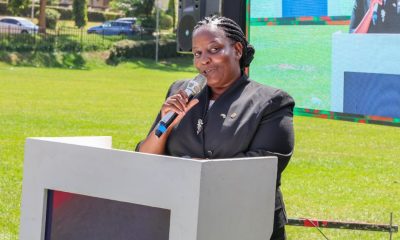

Emorimor Calls for Makerere to Upgrade Parenting Course
-
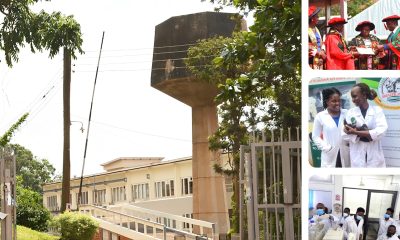

CoVAB Annual Report 2024
-
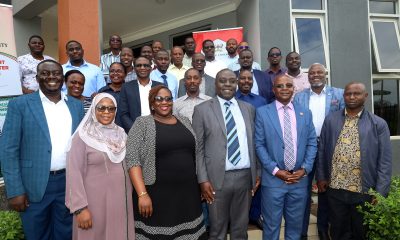

Uganda Deepens Economic Governance with Training on Regulatory Cost-Benefit Analysis
-


Freshers’ Joining Instructions 2025/2026
-
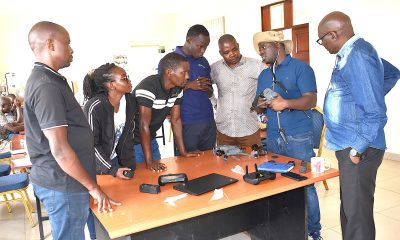

NbS4Tea Project Team Makes Great Progress, Deploys Drones for Data Collection
-


UVCF Makes Case for HEAC Programme
General
Special Exam Results -Diploma in Performing Arts 2025/26
Published
2 days agoon
June 28, 2025By
Mak Editor
The results for the 2025/2026 special entry examination for the Diploma in Performing Arts held on Saturday 17th May, 2025. Candidates who scored a final mark of 50% and above passed the Examination and have been recommended to the university’s Admissions Committee for consideration.
General
Mature Age Scheme Exam Results for 2025/2026
Published
3 days agoon
June 27, 2025By
Mak Editor
The Office of Academic Registrar, Makerere University has released full results for the Mature Age Entry Scheme Examinations for the Academic Year 2025/2026 held on Saturday 14th December, 2024.
The Candidates who scored a final mark of 50% and above passed the examination and have been recommended by the Pre-Entry & Mature Age Committee to the University’s Admissions Board for Consideration.
The Aptitude Exam Results for 2025/2026 Academic Year released in February 2025 can be found here.
General
Call for Application: 2025 SNRM session 4 Summer School
Published
4 days agoon
June 26, 2025By
Mak Editor
Context:
Natural resources in Africa are being depleted at an alarming rate due to several factors, including unsustainable human activities, climate change, and population growth. A primary condition of sustainable development is to ensure that the pressures do not exceed the environmental limits, and that demand for the resources does not exceed levels that can be sustainably provided by nature. Therefore, there is a pressing need for transformative, systems-thinking approaches and tools that can tackle the diverse challenges facing these systems. In Africa, this need is compounded by a lack of data and monitoring, which significantly hinders sustainable decision-making.
Investing in young scientists who are committed to take lead in sustainable management of Africa’s natural resources is very important. Capacity building of young scientists will enhance their knowledge and skill on sustainable natural resources and their involvement for implementation of the sustainable development goals (SDG’s) in Africa. To this effect, SNRM summer schools have been implemented in three sessions in 2019, 2020, and 2022 with support from Volkswagen Foundation; to build a critical mass of skilled and competent young natural resource scientists in Africa through training, capacity building and mentorship. Session 4 (2025) will target competent young scientists (MSc and PhD students) in Africa and Germany to further develop their knowledge and skills in systems thinking, advanced data collection and analysis, and application of emerging digital technologies such as Artificial Intelligence (AI), machine learning (ML), internet of things (IoT), and embracing transdisciplinary approaches. In addition, we include an ideation workshop where students can work on real problems to come up with solutions for sustainable transformations in natural resource use.
Organizers: Leibniz Universität – Hannover (Germany), University of Antananarivo, University of Abomey Calavi (Benin), Makerere University (Uganda), University of Ghana (Ghana), University of Parakou (Benin), The Technical University of Kenya, with financial support from the Volkswagen Foundation (Germany).
Venue and dates: Nairobi, Kenya, 16-28 November 2025
Target: MSc and PhD students, early in the program of less than 35 years of age from any university/research institution in either sub-Saharan Africa or Germany with an interest in natural resources management.
Participants and Scholarships: The course is fully funded and open to 20 MSc and PhD students from Africa, and 5 from Germany. Funding will cover the costs of air ticket, accommodation, meals, visa, and transportation. However, participants will cover the cost of their travel health insurance.
Topics
SNRM Summer School Session 4: Transformative pathways in biodiversity management and conservation.
This summer school is designed to deliver four modules over a two-week period. The modules are designed to enable the students to acquire new ways of designing data collection protocols and analysis for transformative sustainable natural resources management.
Module 4.1: Data collection I
Skills in data collection for a transformative and sustainable management of natural resources (water, wildlife, forest, land, livestock, crops) monitoring and data collection techniques; remote monitoring tools, earth observation system data, e.g. satellite data sources, LIDAR, and UAV aerial images. Collect and analyse In-situ data on biotic and abiotic parameters, map and analyse data using R or Google Earth Engine, field data collection and retrieving data from online databases.
Module 4.2 Data management and processing
Introduction to tools and methods of managing large and diverse data sets of natural resources such as time series, spatial, directional, and multivariate data. Practicals will include data storage, organization and conversion into various formats using databases such as PostgreSQL and statistical programming software such as R and Python; scripts.
Module 4.3 Ecological monitoring, modelling and management
This module aims to teach participants how to anticipate and validate trends that can be observed in various ecosystems. Lectures include ecological monitoring and its design; population monitoring studies; metrics in population monitoring; methods for monitoring and assessing marine ecosystems; human ecology to socio-ecological systems; climate change impact of ecosystems; suitability assessments; overview of the principles underlying wildlife monitoring and prediction systems for climate change adaptation. Practicals will include field data collection (individual and group); ecological data analysis using R or PAST; modelling and experiencing the behaviour of complex systems using Vensim.
Module 4.4 Natural habitat restoration ideation lab
This module is designed to spur students’ innovation and creativity, and to help students comprehensively identify interdependencies across the 17 SDG goals. Participants will be trained on ideation processes for solutions and intervention for transformative natural resource management. They will work collaboratively in small groups on case studies and develop pathways of transformative sustainable natural resource management. Examples of projects include forest (mangrove) ecosystem and habitat restoration, improved technologies for agricultural production, nature-based solutions for improving water quality, and reversing land degradation.
Language: The course will be delivered in English. Participants are expected to be fluent in writing and speaking the English language.
How to apply
Applicants are kindly requested to fill in the application form available from https://snrmafrica.com/ and submit the following documents in English through the system.
- a curriculum vitae (maximum 2 pages)
- a letter of motivation (maximum 1 page)
- a confirmation of university enrolment
- a reference letter from the academic supervisor
- project summary of MSc/ PhD project (1 page including objectives, methodology
and key findings or expected outcomes).
Important dates
Application deadline: 30th June 2025.
Announcement of accepted applicants: 15th August 2025.
Confirmation of attendance by selected participants: 12th Sept 2025.
Summer school held: 16 – 28 Nov 2025.
Further information is available from
The secretariat info@snrmafrica.com
Dr Lydia Olaka lydiaolaka@tukenya.ac.ke
Prof. Dr. Hartmut Stuetzel stuetzel@gem.uni-hannover.de
Trending
-

 General3 days ago
General3 days agoMature Age Scheme Exam Results for 2025/2026
-

 General6 days ago
General6 days agoFreshers’ Joining Instructions 2025/2026
-

 General1 week ago
General1 week agoMastercard Foundation Board pays its inaugural visit to Makerere University
-

 General1 week ago
General1 week agoUVCF Makes Case for HEAC Programme
-

 Natural Sciences2 weeks ago
Natural Sciences2 weeks agoCoNAS Participates in the 2025 National Science Week Exhibition
